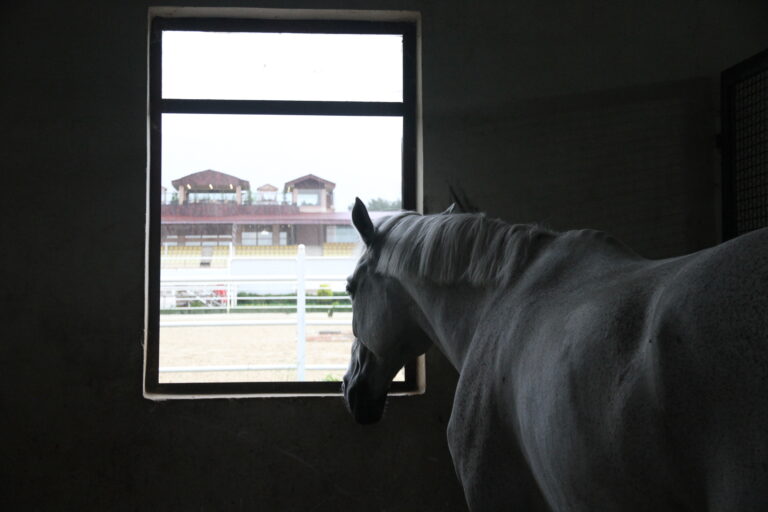Welcome to EquiManagement’s podcast Disease Du Jour, where each podcast will delve into the research and current best practices for a variety of equine health problems with industry experts.
Listen to or download episodes of Disease Du Jour
on iTunes, SoundCloud or Stitcher.
This episode’s guests are Drs. Ernie Bailey, of the Gluck Equine Research Center at the University of Kentucky, and Samantha Brooks of the University of Florida.
Ernie Bailey, PhD, is a Professor at the University of Kentucky’s Gluck Equine Research Center. His key areas of interest are immunogenetics and genomics. He is interested in the genetic influences on the innate and adaptive immune systems that protect the horse from infectious diseases. Other interests include the development of the genetic map for horses and investigation of genes involved in the health of the horse, such as contracted tendons, extreme lordosis and dwarfism.
Bailey received his Bachelors of Science in genetics from the University of California, Davis, in 1973, then received his Masters in comparative pathology from UC Davis in 1975 and his PhD in genetics from that university in 1980.
Samantha Brooks, PhD, is an Associate Professor of equine physiology at the University of Florida’s Department of Animal Sciences. After she received her BS degree in agricultural biotechnology from the University of Kentucky, Brooks earned her PhD in equine genetics under the mentorship of Bailey. She then was awarded the Paul Mellon Postdoctoral Fellowship to study the expression of inflammatory genes in horses affected with laminitis.
In 2009, Brooks became an Assistant Professor at Cornell University’s Department of Animal Science. In 2014, she moved to the University of Florida and has moved up through the ranks to Associate Professor.
Her research program explores a variety of topics relevant to horse health ranging from gene expression studies to mapping of genetic disorders in the horse. Previously her research group discovered genetic mutations and markers for coat colors, height, sarcoid tumors and two neurological conditions. Ongoing work targets variation in gait, susceptibility to infectious disease, metabolic syndrome and skeletal defects using genome-wide association, genome re-sequencing and transcriptomics.
This Disease Du Jour podcast covers the topic of Genes as Management Tools. We discuss how genetics touches equine veterinarians on a day-to-day basis; adaptation and evolution; fragile foal syndrome; OCD; roaring; reproduction; and infectious disease.
Listen to or download episodes of Disease Du Jour
on iTunes, SoundCloud or Stitcher.
Previous Episodes of Disease Du Jour
Episode 10 – Angela Pelzel-McCluskey, DVM, MS, who is a National Equine Epidemiologist for the United States Department of Agriculture (USDA), Animal and Plant Health Inspection Service (APHIS), Veterinary Services, talks about vesicular stomatitis virus.
Episode 9 – Kent Allen, DVM, owner of Virginia Equine Imaging and a founder of ISELP, talks about Lameness Diagnosis and ISELP. Allen shares with us his triage system for a lameness case. We also discuss what imaging modalities veterinarians should have access to, either themselves or through a consulting vet/practice/school.
Episode 8 – Roberta Dwyer, DVM, MS, DACVPM (epidemiology specialty), discussed biosecurity factors that equine veterinarians need to understand in order to best prevent and control disease spread on client farms.
Episode 7 – Martin Nielsen, DVM, PhD, DipEVPC, DACVM, one of the world’s leading equine parasitology researchers who is an associate professor at the University of Kentucky’s Maxwell H. Gluck Equine Research Center. Nielsen discusses the value of checking efficacy of dewormers; the evolution of parasites and the science surrounding them; recent papers on parasite modeling; evaluating parasite control programs, combination deworming practices and the science behind them—good and bad.
Episode 6 – Peter Timoney, MVB, MS, PhD, FRCVS, the Frederick Van Lennep Chair in Equine Veterinary Science and a Professor at the Gluck Equine Research Center at the University of Kentucky. TImoney discusses equine infectious diseases, with a focus on factors that compromise normal pregnancy and the adolescent horse.
Episode 5 – Robert Holland, DVM, PhD, a private practice veterinarian in the Central Kentucky area focusing on respiratory problems and infectious diseases, talks about Respiratory Tips from the Field.
Episode 4 – Bonnie Barr, VMD, DACVIM, an internal medicine specialist at Rood and Riddle Equine Hospital in Kentucky, talks about common neonatal problems in this podcast.
Episode 3 – Tom Chambers, PhD, who heads the OIE Reference Laboratory for equine influenza at the University of Kentucky, discusses equine influenza.
Episode 2 – Tom Riddle, DVM, DACT (hon), a founding partner of Rood and Riddle Equine Hospital in Lexington, Kentucky, discusses breeding season procedures that he has developed over his decades-long practice.
Episode 1 – Steve Reed, DVM, DACVIM, of Rood and Riddle Equine Hospital in Lexington, Kentucky, discusses equine herpesvirus and equine herpesvirus myeloencephalopathy.
Listen to or download episodes of Disease Du Jour
on iTunes, SoundCloud or Stitcher.



![[Aggregator] Downloaded image for imported item #18385](https://s3.amazonaws.com/wp-s3-equimanagement.com/wp-content/uploads/2025/09/30141329/EDCC-Unbranded-11-scaled-1-768x512.jpeg)
